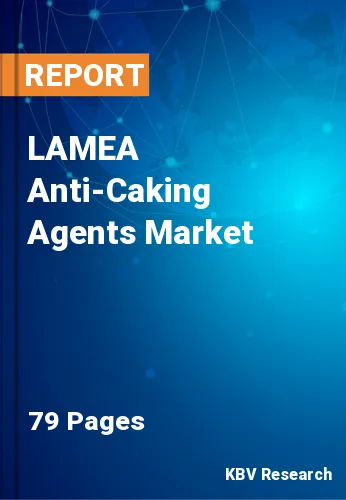
The Latin America, Middle East and Africa Anti-Caking Agents Market would witness market growth of 7.8% CAGR during the forecast period (2022-2028).
Food additives are described as "Substances, included in food to maintain or enhance safety, freshness, flavour, texture, and appearance" by the World Health Organization. Without being a significant ingredient, it is also added during food manufacture, processing, packing, and storage. For ages, several food additives have been utilized to preserve fruits, vegetables, and meat-based foods.
The use of salt in meats, bacon, or dried fish, sugar in marmalade, and Sulphur dioxide in wine are a few of the best examples. The increasing disposable income and shifting consumer preferences are also significant drivers for market growth. It is important to highlight that the market is expanding as a result of the rising demand for cereal and coffee.
For the purpose of boosting their market share in the worldwide cigarette vending machine market, the major players in the anti-caking agents’ sector are utilising a variety of techniques, including partnerships, collaboration, mergers, and acquisitions. Additionally, a lot of manufacturers and retailers have begun to collaborate on vending machines that have been converted. The two's partnership will increase the market need for anti-caking agents.
Spices and herbs are essential to Middle Eastern cuisine. The exotic spices and herbs used in the meal's preparation give it character and fragrance. Growth is predicted since spices are essential to the sociocultural context, daily diet, and numerous ethnic groups throughout the Middle East and Africa. This common spice, which is Egyptian in origin, has become well-known. Coriander seeds, Sesame seeds, hazelnuts, and a few more ingredients combine to create a subtle yet distinctive flavour. However, for those looking for an authentic experience, the drive to the ancient Spice Market is well worth taking at least once. There are a range of needs in this market as a result of the increase in tourism and hospitality in the area, which is expected to offer producers opportunities. As a result, the market for anti-caking agents will grow as seasoning consumption rises and anti-caking agent needs rise.
The Brazil market dominated the LAMEA Anti-Caking Agents Market by Country in 2021; thereby, achieving a market value of $28.1 million by 2028. The Argentina market is showcasing a CAGR of 8.4% during (2022 - 2028). Additionally, The UAE market would register a CAGR of 7.5% during (2022 - 2028).
Based on Type, the market is segmented into Calcium Compounds, Sodium Compounds and Others. Based on Source, the market is segmented into Synthetic and Natural. Based on Application, the market is segmented into Dairy, Bakery, Seasonings & Condiments and Others. Based on countries, the market is segmented into Brazil, Argentina, UAE, Saudi Arabia, South Africa, Nigeria, and Rest of LAMEA.
Free Valuable Insights: The Global Anti-Caking Agents Market is Predict to reach $1.5 Billion by 2028, at a CAGR of 6.2%
The market research report covers the analysis of key stake holders of the market. Key companies profiled in the report include Evonik Industries AG (RAG-Stiftung). PPG Industries, Inc., Agropur Dairy Cooperative, Huber Engineered Materials (J.M. Huber Corporation), Kao Corporation, Solvay SA, Univar Solutions, Inc., Cabot Corporation and Brenntag SE .
By Type
By Source
By Application
By Country
Our team of dedicated experts can provide you with attractive expansion opportunities for your business.
